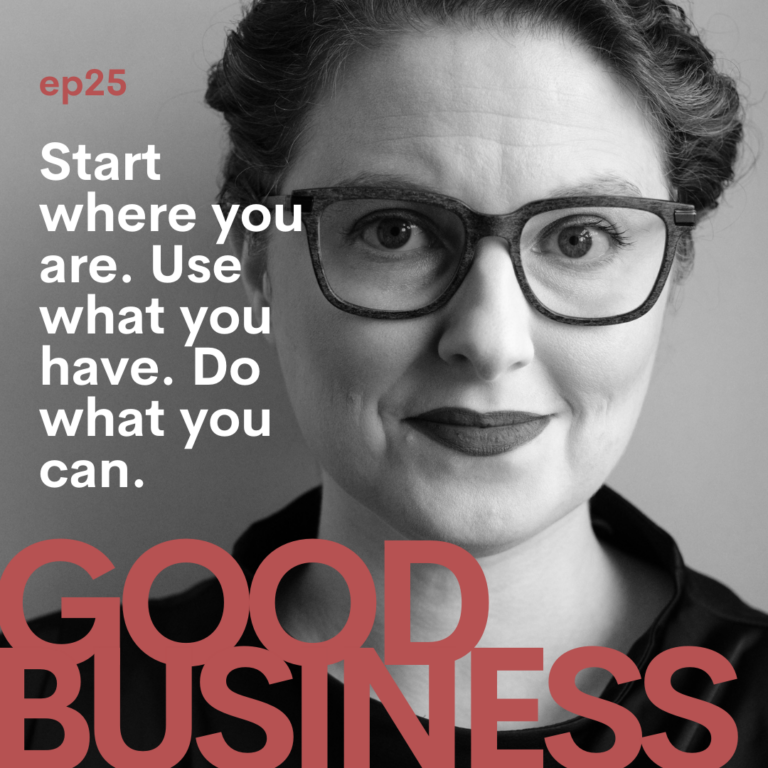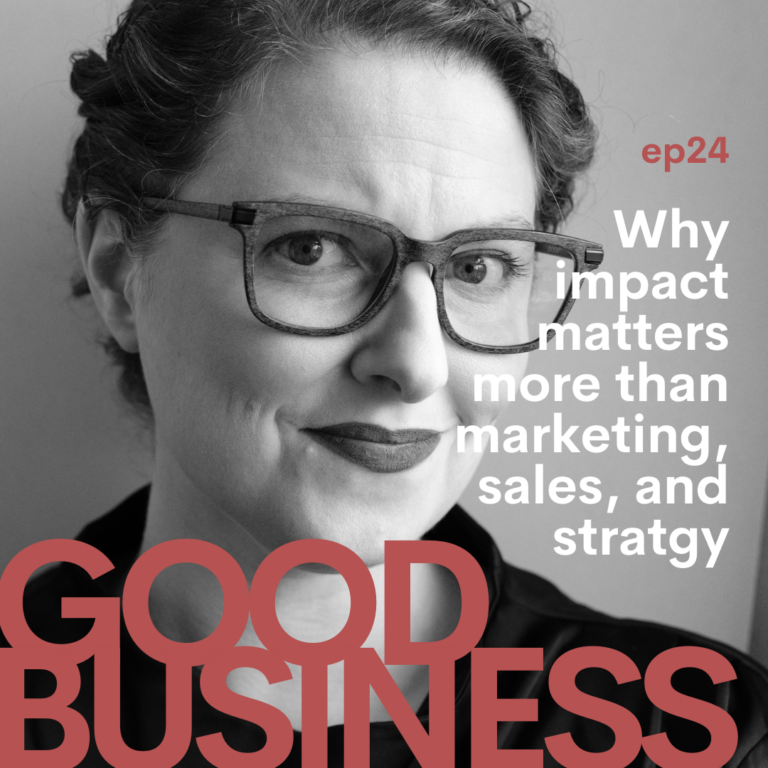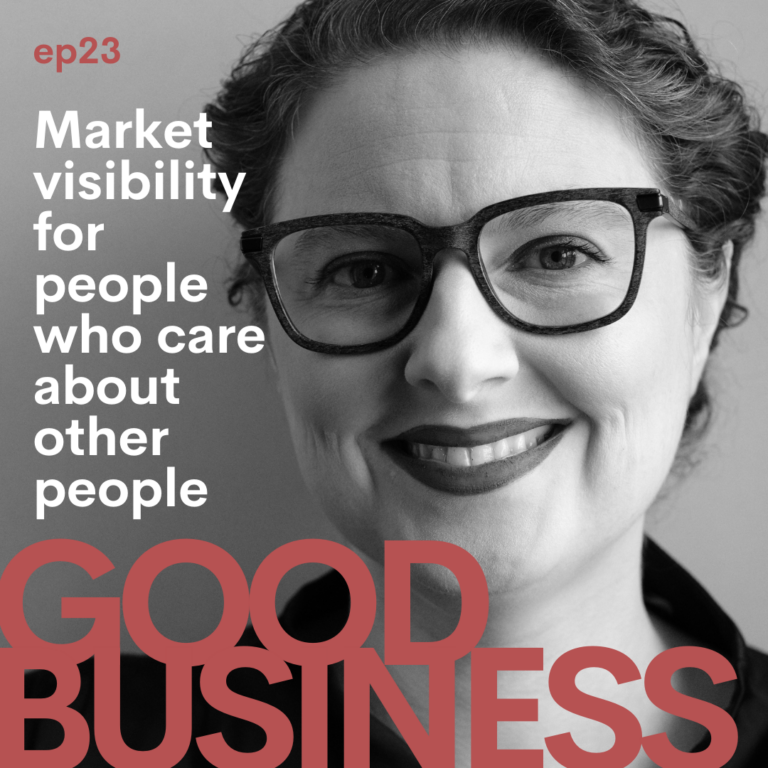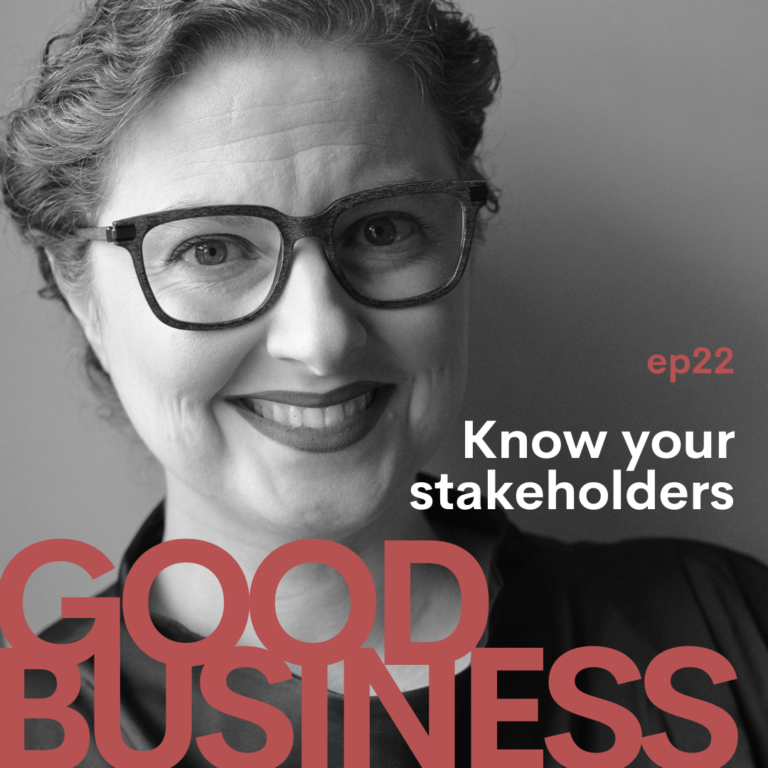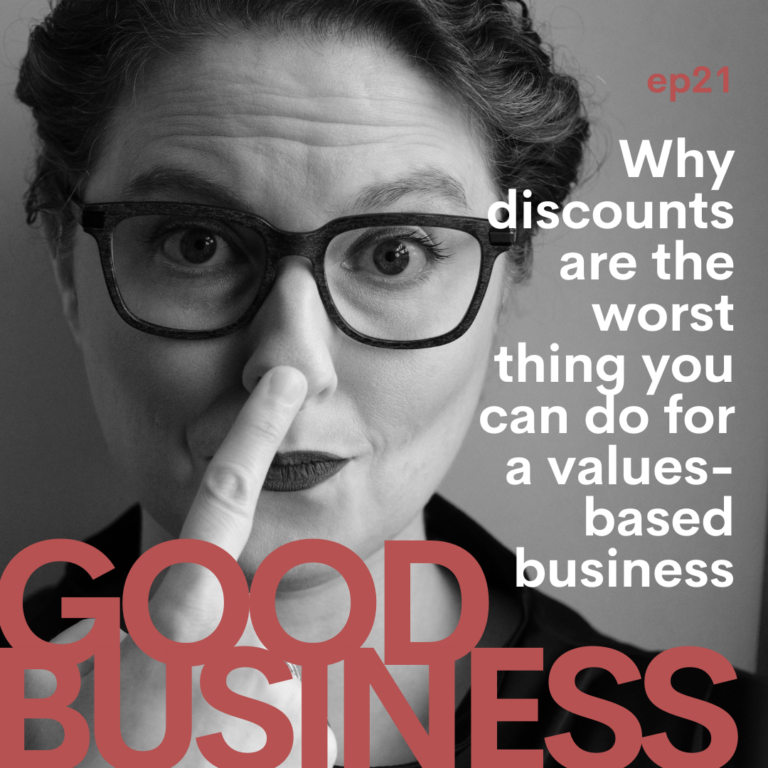Transcript:
Welcome back to The Good Business Podcast. I’m your host, Illana Burk, and today’s topic is one I get pretty fired up about. Today we’re talking about why it is the right thing to do to give out your work, your very best work, generously, and everywhere you can.
Today’s episode is inspired by a recent experience I had signing up to attend a quote unquote, really useful webinar. Long and short of it is that literally every time I break down and go like, yeah, I’m going to stop being such a know it all and I’m going to sign up for that webinar and I’m going to listen to that podcast or attend that workshop,
I’m sure I’ll learn something. I am almost always reminded why I shouldn’t. And maybe I am just jaded, honestly. I mean, there’s no maybe. I’m just jaded. But really, good God, the absolute absence of real ideas or new information these days is downright painful. I’m sure everyone listening has had that experience of falling into somebody’s marketing funnel and very persuasive sales language and you think, This is the webinar that’s gonna not be a waste of my time, and then it is.
And then it’s, you know, a whole bunch of Q& A you didn’t ask for, and a whole bunch of fluff, and maybe one itty bitty tiny interesting point buried under a mountain of salesy garbage. This was no exception.
On this particular webinar. I sat through like two hours of talks from six different, I’m doing lots of air quotes today, leaders, quote unquote, leaders, uh, all talking about pretty, like one really pretty juicy topic.
I mean, I signed up for it because the topic was interesting to me. And I was curious what these people would have to say about it. And they all had that, like, I’m a big time, fancy leader who has it all figured out voice. You know, it’s very like stern and a little bit patronizing, you know, it always reminds me of the waitress at restaurants that walks up and it’s like, you hear her talking to her coworkers and she sounds completely different and then she walks up to your table and she’s like, hi, welcome to whatever restaurant, how are you today?
And it’s just so like false. That’s the voice. You guys know the voice.
And they all with one small kind of almost exception that was actually kind of interesting and useful and happened to be somebody that I personally know, which is funny, said absolutely nothing new, like nothing at all. And they all actually basically said the same exact things as each other in different ways, and none of them address the elephant size hole in their fundamental position that they all shared.
And yes, I am being vague about this intentionally. Usually I am happy to like name names and whatever, but like, this is just not a drag worthy topic. It’s not about them. It’s much more about the more macro topic. And I don’t really want to be explicit about that. Cause that’ll make it about that and not about actual points.
So we’re going to just go ahead and like verbally “vague book” here.
The much bigger point is that seriously, how do people make money wasting other people’s time this much? Makes me crazy. It’s just, one of my biggest pet peeves. I just legitimately do not understand the point of all the regurgitated nonsense. I can’t even call it content because it lacks any actual real content.
When I was starting out and this is, oh my god, I’m like, I’m literally doing like back in my day comment here, but I’m, I’m going in. Go with me here, right? I’m okay if I sound old.
When I was starting out, bloggers talked about putting your absolute best work out there for free.
I loved that, clearly. I do that. I always have. I guess I missed the memo somewhere along the way when that was supposed to have changed. I just kept doing that because it felt good, it felt right, and it’s been very, very successful for me. So, that’s what I built my business around.
So many people have built their businesses saying they want to create change through their ideas, that they want to help people through their work, but then they make them jump through every possible hoop to get anything of real value.
Like that doesn’t, that’s not helping. That’s not helping. And all that tells me is that one, you are short on actual brilliance or creativity. Two, you care about money way more than change or other people or your work actually proliferating out into the world in any meaningful way. And three, you never stop to think about what you’re doing.
And when you do shit like this, it instead follows the same tired playbook that created all kinds of companies and culture that you ran from when you started your business, right? Let’s sell them fluff, more fluff, more fluff, with just enough kernels of good stuff that makes you just dig a little deeper.
That’s a marketing funnel, folks, for those of you at home, right? Like little, little bits so that you have to go deeper and deeper and deeper to get the actual content. And it’s like just enough, like little breadcrumbs until like, I always think of Hansel and Gretel when I think of marketing funnels, like little bits of candy until pretty soon you’re in somebody’s oven.
Right? Okay.
So my guess is that this is a product of ever increasing pressure to produce more and more and more content. I think that’s what that came from.
Somewhere along the way, we started saying that things had value instead of actually making sure that they have value. You know, as we feel this urge to produce, the more diluted our ideas become because we first were told that we have to have a singular idea like our singular our big core message. I mean, I teach this. Yes, I teach this, but I also teach you how to break it down and address everything around your big ideas.
But most people just go here’s my one thing. And if I give away the solutions around my one thing, then I won’t have anything to sell, right? So I better hold back the solutions to my one big thing until you’re actually paying me.
And it’s become a deeper and deeper manifestation of scarcity. And it’s, it’s really a bummer because like it, it fosters the idea that the creative well is going to run dry eventually, but it’s like, it’s a totally backward solution because in the climate of increasing competition, and this is the most important part.
If you’ve like tuned out and you’re not actually listening to me yammering on, this is the part where you should tune back in. Okay.
Because in a climate of increasing competition, the very last thing that any of us should be doing is watering down our ideas that make us special. That’s the very last thing you should be doing.
Because special is what gets attention. Special is what makes an impact. Special is what breaks through the crowd and makes you sound interesting. And most importantly, special is what helps people. And if you say that’s what you’re here for, special is what you need to put out there. Freely. Openly and repeatedly.
Now, I know the standard objection to this is usually something like, but if I give it all away, why would anyone buy anything from me? The answer is very simple. People hire you because they have already seen that you offer amazing value repeatedly and freely. They hire you because now they know you’re brilliant and they want more of your brilliance applied to their specific problems.
We have to stop behaving as if our creative well will just suddenly run dry one day. It won’t. So give as much as you can without compromising your ability to sustain yourself and your work in the world. That last bit is also pretty important. It’s what I’ve done for my entire career and I don’t have a single regret.
Okay. That is it for today, everyone. As always, thank you so much for your attention and for investing in good business.
Giving stuff away is not the easiest topic and uh, we all have to do it as part of our businesses in one way or another. And I just want to encourage all of you one last time, give things freely because the world needs you.
And if you wait for people to hire you all the time, the world never gets a chance. So give it away. All right. If anybody has, uh, questions or things to say about this, uh, I would love it if you come find me on social media. I’m easy to find on Facebook these days. And this is something that I would love to, um, engage with more about with anybody who would like to talk about it.
So, all right, everybody have a really great one and I will see you all in a couple of weeks. Bye.
More Episodes
Start where you are. Use what you have. Do what you can. | GB 25
Today’s episode of The Good Business Podcast is all about my very favorite quote in the whole world. “Start where you are. Use what you have. Do what you can.” by Arthur Ashe
Why impact matters as much as marketing, sales, or strategy. Maybe more. | GB24
Today’s episode is less of a lesson than recent episodes. Instead, today we’re making a case for a topic we’ll be talking a LOT more about in the future: IMPACT. What it is. Why it matters. And how to pay attention to it.
Market visibility for people who care about other people | GB23
Today is a branch off of our stakeholder conversation. If you listened to that episode, you should have a clear picture of exactly who matters to you and your work and why, as well as how much time you have for your work without sacrificing what those VIPs need and expect from you. Next up, we talk about exposure, protection, and the responsibility you have to those who matter most.
Know Your Stakeholders | GB22
In this episode, I’m going to walk you through how to think about establishing your stakeholders, the steps you need to take to do so, and how to make decisions based on who they are without compromising those big fat dreams we’ve been talking about.
Pricing Basics: Why discounts are almost never a good idea | GB21
Today’s episode dovetails on our last one, where we talked all about how your value isn’t determined by your price tag. Today, we’re talking about discounts. First, we’ll talk about why businesses offer them, what their purpose is and when they ARE a good idea. Then we’ll talk about why they are probably a bad idea for you and what to do instead.
Pricing Basics: Your value is not attached to your price | GB20
This episode breaks down the popular trope that if you don’t charge a lot, people won’t value your work. First, we talk about the conditions that make this a common piece of advice. Then I lay out why this is complete crap for certain kinds of businesses. Finally, the episode wraps up with a brief primer on how to think about pricing in a way that serves your people AND your bigger dreams for yourself.

